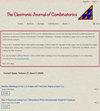Proof of a Conjecture Involving Derangements and Roots of Unity
IF 0.7
4区 数学
Q2 MATHEMATICS
引用次数: 4
Abstract
Let $n>1$ be an odd integer, and let $\zeta$ be a primitive $n$th root of unity in the complex field. Via the Eigenvector-eigenvalue Identity, we show that$$\sum_{\tau\in D(n-1)}\mathrm{sign}(\tau)\prod_{j=1}^{n-1}\frac{1+\zeta^{j-\tau(j)}}{1-\zeta^{j-\tau(j)}}=(-1)^{\frac{n-1}{2}}\frac{((n-2)!!)^2}{n},$$where $D(n-1)$ is the set of all derangements of $1,\ldots,n-1$.This confirms a previous conjecture of Z.-W. Sun. Moreover, for each $\delta=0,1$ we determine the value of $\det[x+m_{jk}]_{1\leqslant j,k\leqslant n-1}$ completely, where$$m_{jk}=\begin{cases}(1+\zeta^{j-k})/(1-\zeta^{j-k})&\text{if}\ j\not=k,\\\delta&\text{if}\ j=k.\end{cases}$$一个涉及无序和统一根的猜想的证明
设$n>1$为一个奇整数,设$\zeta$为一个原始的$n$复域的单位根。通过特征向量-特征值恒等式,我们证明了$$\sum_{\tau\in D(n-1)}\mathrm{sign}(\tau)\prod_{j=1}^{n-1}\frac{1+\zeta^{j-\tau(j)}}{1-\zeta^{j-\tau(j)}}=(-1)^{\frac{n-1}{2}}\frac{((n-2)!!)^2}{n},$$,其中$D(n-1)$是$1,\ldots,n-1$的所有无序的集合,这证实了之前的猜想Z.-W。太阳。此外,对于每个$\delta=0,1$,我们完全确定$\det[x+m_{jk}]_{1\leqslant j,k\leqslant n-1}$的值,其中$$m_{jk}=\begin{cases}(1+\zeta^{j-k})/(1-\zeta^{j-k})&\text{if}\ j\not=k,\\\delta&\text{if}\ j=k.\end{cases}$$
本文章由计算机程序翻译,如有差异,请以英文原文为准。
求助全文
约1分钟内获得全文
求助全文
来源期刊
CiteScore
1.30
自引率
14.30%
发文量
212
审稿时长
3-6 weeks
期刊介绍:
The Electronic Journal of Combinatorics (E-JC) is a fully-refereed electronic journal with very high standards, publishing papers of substantial content and interest in all branches of discrete mathematics, including combinatorics, graph theory, and algorithms for combinatorial problems.

 求助内容:
求助内容: 应助结果提醒方式:
应助结果提醒方式:


